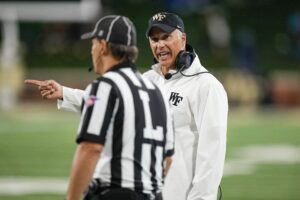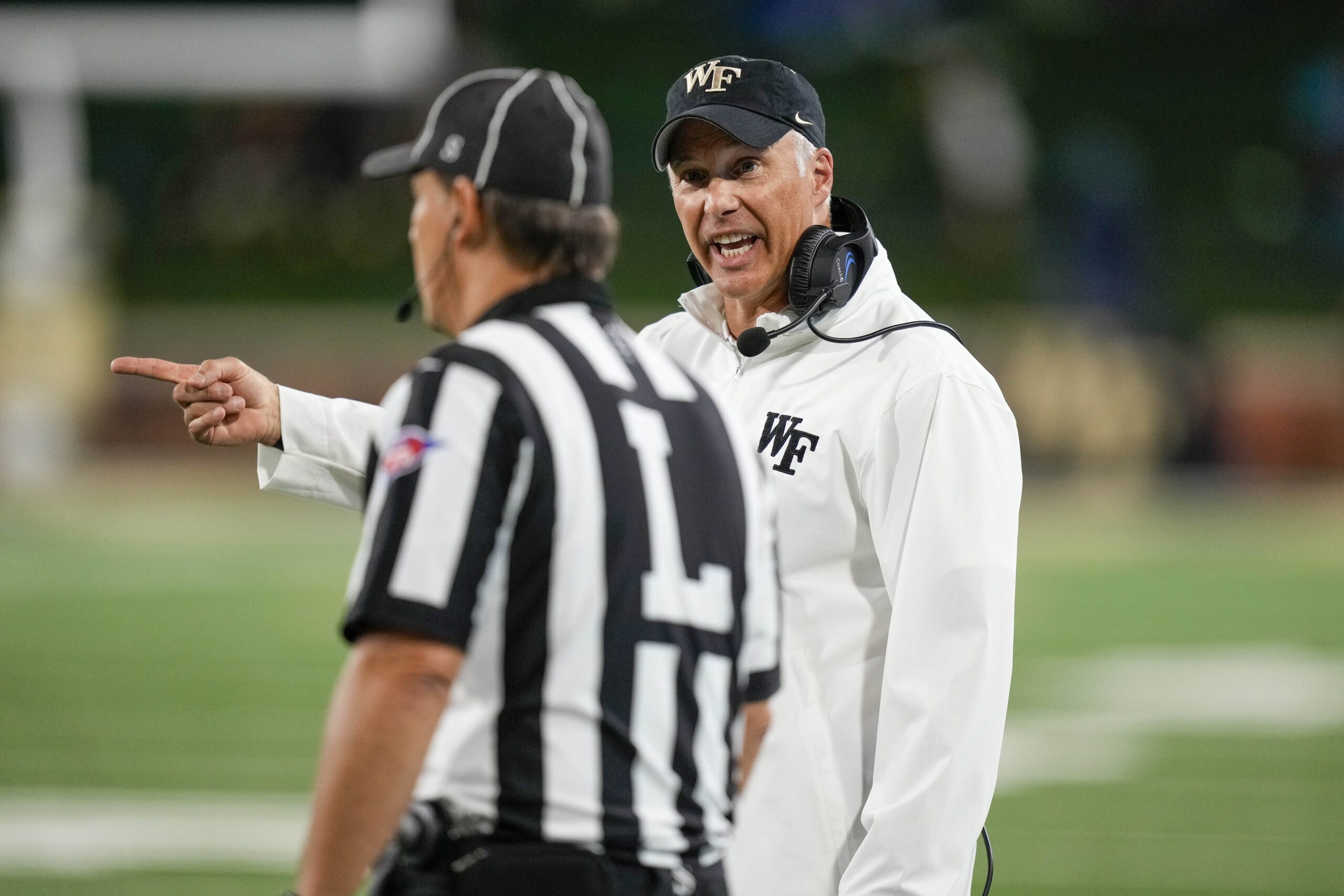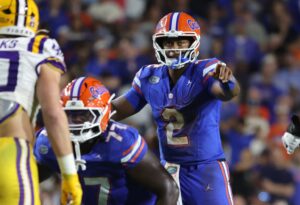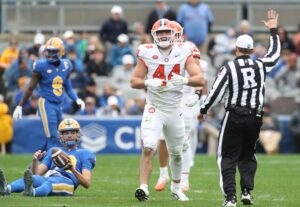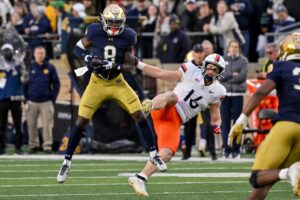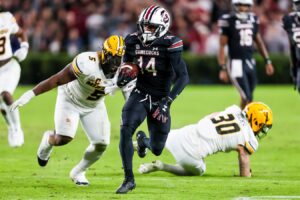We have come to that point in the Wake Forest season where the record is split. The fan base is also split and any list of what is wrong with this team is both lengthy and will take longer to fix than anyone would like. What’s wrong with Wake Forest turns out not to be equal parts intricate and discernible. Defenses over the last three weeks have figured out what is wrong with the Demon Deacons offense, and they have exploited it. But coming up with solutions, in a serious manner, is not that easy.
After a humiliating 30-13 loss at Virginia Tech Saturday, there are more questions than there are legitimate answers that go beyond speculation and blaming injuries. No one wants to hear that this will not be fully resolved in time for Saturday’s Homecoming game against Pitt. It may not be fully resolved before the season is over. It is going to be a process and it takes thoughtful analysis and time from the coaching staff.
Predicted Transition…Sort of
During the Summer, before doing the predicted conference finish, it’s useful to go through everyone’s schedule and figure out the wins and losses. This publication had Wake Forest at 7-5, while quietly considering 6-6 may be more reality. Everyone with any sensibility knew 2023 was going to be a form of a transition year, especially at quarterback.
Well, 7-5 is out the door, and 6-6 seems like pie in the sky. The Demon Deacons are 3-3 overall, 0-3 in the conference, and two of the losses came against teams we had them pegged as beating. And the hard part of the schedule is still in front of them.
What Works?
“Let’s look at this thing from a… um, from a standpoint of status. What do we got on the spacecraft that’s good?” -Ed Harris playing NASA flight director Gene Kranz in the movie Apollo 13.
The answer for the Wake Forest offense is, “nothing.” Nothing is good right now. This is not hyperbole. This is from watching potential all of Spring and Fall camp and then into the meltdown of the season. Some people have come to the realization lately that quarterback Mitch Griffis is listed at 5-10 and has a three-quarter to sidearm throwing motion. That makes the slow mesh portion of the offense untenable. How does a short quarterback who does not come over the top go up to the defensive line to throw? To that, we wonder, where have you been?
Griffis has been 5-10ish with a sidearm motion for a really long time now. This is not a new development. In Spring, we suggested that there was going to need to be a lot more rolling out and throwing on the run than slow mesh. There was no chance he was going to grow or change his throwing motion over the next four months.
But as poor of a fit as the slow mesh is for Griffis, and he is for it, it accounts for maybe 25% of the plays run. It is not the primary problem. Griffis’ inability to see the field in front of him (no, we are not making a size/height joke), and command the offense accordingly is the issue.
Saturday after the game, head coach Dave Clawson expressed surprise at the current state of the offense. “After going through Fall camp, and you guys [the media] were at Fall camp, I didn’t see this coming from a mile away.”
Practice Is Not A Game
But little about any team’s Fall camp resembles real game functionality and speed. Griffis could look terrific in Fall camp, but in no game does any quarterback ever get the time to read the defense that they get in practice. Now that it is real speed, Griffis is not picking it up quickly enough. The reads and reactions are not there. He was six for 11 for 27 yards and an interception when he was pulled for Michael Kern Saturday. He finished 14 of 22 for 166 yards. And while some of his throws looked better, there was no real sign of a forward-moving offense.
On the season, Griffis is throwing at a 59% completion rate. He has nine touchdowns and six interceptions. There are also fumbles, misreads, and poor decisions. This is not the pile on Griffis column. He is one of the more likable young men you’ll meet on a football team. Even after losses, he faces the questions and tries to give sincere answers, something his predecessor was rarely compelled to do as QB1 last year.
The Problems Are Spread Around
But this is bigger than your likeability factor. It is also not all on him. An offensive line with plenty of game experience, if not starts, is playing poorly. The edge blocking, (including tight ends), has left both Griffis and Kern vulnerable on the outside. The inability of the running backs to pass protect consistently has made it a given that blitzes are going to come from everywhere. Combine all of those elements and you have no running game and have hung a quarterback out to dry when he was already having problems mastering the basic functionality of the offense. The poor passing game leads to a lack of opening for a running game. And the inability to run the ball leads to a defense with ears pinned back.
“They see how we’ve handled blitzes, and they blitzed the heck out of us,” Clawson said Saturday of VA Tech’s defensive scheme. It’s pretty safe to say we have the defensive scheme for the opponents for the next six games. “Right now, if you’re playing us, you’re going to make our quarterback beat you,” Clawson added.
The Defense Is Mostly Doing Its Job…For Now
The Wake Forest defense has been modestly better this season. The Demon Deacons are 53rd in the country in total defense, giving up 359 yards per game. Last year they surrendered 406 per game. They have reduced the number of times they are getting beat deep and lowered the amount of explosive plays they give up. The defense kept Wake in the game against Clemson and VA Tech.
It’s not going to last. Not when the offense can’t sustain drives and stay on the field, giving the defense a rest. And oh, by the way, the defense has yet to face the best of the best in ACC quarterbacks.
The offense is bad. And the poor offense is even making the defense vulnerable. So where does Wake go from here before the season completely circles the drain?
A Complete Assessment By Clawson Is Needed Before You Have Finished Reading This Article
“I don’t care about what anything was DESIGNED to do, I care about what it CAN do.”– Ed Harris playing NASA flight director Gene Kranz in the movie Apollo 13.
Clearly, you do not scrap an offense and start over in the middle of the season. The offensive schemes are what they are. But just as clearly, you cannot go through this week of practice thinking some band-aids are going to cover the gaping wounds.
Clawson told the media Saturday that in the past when such issues have occurred, and they have, it is about stripping down the scheme to its useable parts. “Anytime that I have been in this position of struggling, the answer is to do less, not more,” he said. “You kind of say what are we doing well, and you try to build on that.” When pressed, he acknowledged that it is going to take a lot of quick work to find what they are doing right, because it is not obvious at first glance.
Receiver Taylor Morin said Saturday that Clawson had challenged the team in the locker room after the game. “Either lay down and call it quits the rest of the season or you fight.” Defensive back Malik Mustapha said the players need to, “Find their ‘Why,’” as in why they play football, why they go through the work and the hours, and why they want this.
Clawson’s Role
Clawson doesn’t have to answer the “why.” His years climbing up the coaching ranks have already answered that. But he does have to answer the “how,” as in how did this happen. He is a historian of his own past. He is quickly able to recall years in his coaching jobs where similar instances occurred, no matter what they are.
And maybe there is an answer in his history. Because right now, a roster full of fourth, fifth, and sixth-year players who have grown up in the system cannot run his offense well enough. They are all his recruits. At this point in his tenure, this can be a transition year. But it is not supposed to have to be a rebuild. Not with his veteran roster. And asking players to do something they can’t do creates on-field issues. A coach is supposed to assess and judge the capabilities of those in the system and retool that system to their capabilities. The coach has to find the parts that still work. Presumably, that is how Clawson spent his Sunday.
